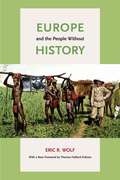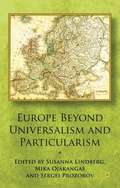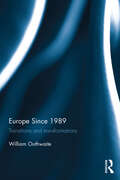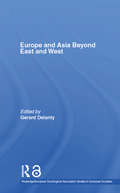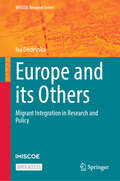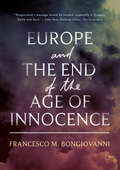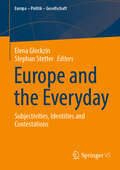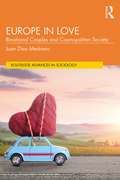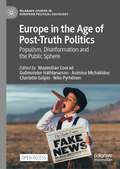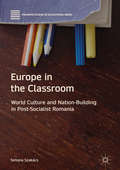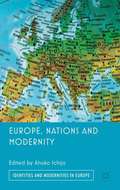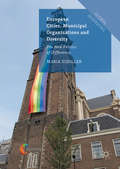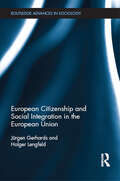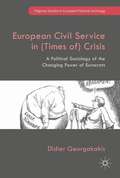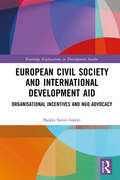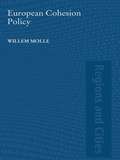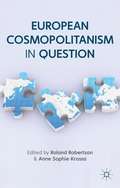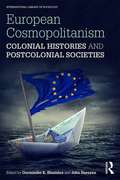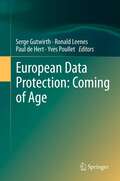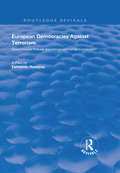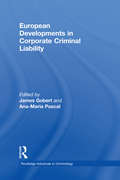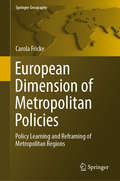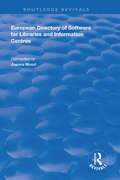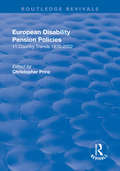- Table View
- List View
Europe And The People Without History
by Thomas Hylland Eriksen Eric R. WolfOffering insight and equal consideration into the societies of the "civilized" and "uncivilized" world, Europe and the People Without History deftly explores the historical trajectory of so-called modern globalization. In this foundational text about the development of the global political economy, Eric R. Wolf challenges the long-held anthropological notion that non-European cultures and peoples were isolated and static entities before the advent of European colonialism and imperialism. Ironically referred to as "the People Without History" by Wolf, these societies before active colonization possessed perpetually changing, reactionary cultures and were indeed just as intertwined into the processes of the pre-Columbian global economic system as their European counterparts. Utilizing Marxian concepts and a vivid consideration for the importance of history, Wolf judiciously traces the effects and conditions in Europe and the rest of the "known" world, beginning in 1400 AD, that allowed capitalism to emerge as the dominant ideology of the modern era.
Europe Beyond Universalism And Particularism
by Susanna Lindberg Mika Ojakangas Sergei ProzorovResulting from an interdisciplinary dialogue between philosophy, political science and International Relations about Europe as a political community this volume rethinks the European political project beyond the rigid opposition between universalism and particularism approaching Europe as a space of the exposure of differences to each other.
Europe Since 1989: Transitions and Transformations
by William OuthwaiteEurope Since 1989 charts the development of Europe east and west since the 1989 revolutions. It analyses the emergent European society, the development of a European public sphere, and civil society. Most books on Europe are heavily biased to the West and Europe Since 1989 takes the opposite approach. It argues that the transformation of the postcommunist world has implications for the whole of Europe and explores the interplay between long-term fundamental tendencies and chance events and the possible futures which confront contemporary Europe. With close attention to political, economic and other social transformations, and an appendix which gives special attention to European macro regions (Nordic/Baltic Europe, Mediterranean Europe), it offers a sociology of Europe with a strong interdisciplinary emphasis.
Europe and Asia beyond East and West (Studies in European Sociology)
by Gerard DelantyThis major new book tackles key questions on Europe in the context of shifting parameters of East and West. The contributors - sociologists, anthropologists, philosophers and historians - show, from a variety of different perspectives, that the conventional equation of Europe with the West must be questioned. Featuring four thematically organized chapters, the book looks at: a post-Western world Asia in Europe: encounters in history between Europe and Asia otherness in Europe and Asia. Exploring new expressions of European self-understanding in a way that challenges recent ideological notions of the ‘clash of civilizations’, this outstanding work draws on recent scholarship that shows how Europe and Asia were mutually linked in history and in contemporary perspective. It argues that as a result of current developments and the changing geopolitical context, both Europe and Asia have much in common and that it is possible to speak of cosmopolitan links rather than clashes. This book will be of great value to students and researchers in the fields of sociology, European politics and history and cultural theory.
Europe and its Others: Migrant Integration in Research and Policy (IMISCOE Research Series)
by Iva DodevskaThis open access book joins other critical works that draw attention to the ways integration is debated, legislated, conceptualized, monitored, evaluated, and ultimately, normalized as a mode of governance. Situated at the interstices of migration studies, European studies, and the social studies of science, the book examines the role of social scientific research, EU policy, and research-policy collaboration in shaping the &‘migrant integration&’ paradigm in Europe. Amidst heated debates on immigration and &‘migrant integration&’, the European Union becomes an increasingly relevant actor, where important resources are earmarked for the implementation of civic integration measures, as well as for producing &‘evidence&’ to guide policy. Simultaneously, a prolific scholarship attempts to understand, measure and compare how and whether immigrants are &‘integrated into society&’, often in the effort to remain &‘policy-relevant&’. Interested primarily in integrationism as a technique of power, the book takes a decolonial and genealogical approach to understand how integrationist discourses that are produced at these two sites – research and EU policy – are situated within wider and intersecting systems of hierarchy. The main argument is that the politics of integration research and the scientific claims in &‘evidence-based&’ policy intersect to produce &‘integration&’ as the hegemonic paradigm in governing migration-related diversity in Europe. Through discourse analysis of research publications, policy documents, media statements, as well as an analysis of the EU&’s science-for-policy community, the book examines how integration comes to be seen simultaneously as a political problem and an object of scientific fascination; how integration is regulated at supranational (EU) level and through science-policy collaboration, and what are the effects of integrationism, as a rationality of governance, on its target subjects. Ultimately, the book shows that the practices of regulating, governing, measuring, theorizing and monitoring the integration of immigrants are shaped by power dynamics linked to the preservation of European liberal subjecthood against rapid demographic, social, political, and environmental shifts.
Europe and the End of the Age of Innocence
by Francesco M. Bongiovanni“Bongiovanni’s message should be heeded, especially in Brussels, Berlin and Paris” – John Peet, Political Editor, The EconomistFrancesco Bongiovanni returns with a sequel to The Decline and the Fall of Europe, a book Guardian journalist Nils Pratley labelled 'a wake-up call for the twenty-first century'. Since 2012 Europe has been confronted with new, unexpected game-changing challenges such as the refugee crisis and its human tsunami, the surprise of Brexit and the explosion of 'alternative' politics. Europeans have finally come to realize that the open-societies that they have been comfortably living in are under threat and fragmenting, leaving their survival uncertain. Minorities are falling prey to an Islamist ideology that conveys values and customs diametrically opposed to European ones. Terrorist acts have become the 'new normal', part of daily life. The North-South cleavage brought about by the eurozone crisis is now completed by a deep East-West cleavage born from the refugee crisis. Against this backdrop, a Germany that is not all that it seems has become Europe’s de-facto ruler, but is unfit to lead, while Trump’s America cannot be counted on as it once used to be, forcing Europe to fend for itself. A beacon of stability and prosperity in the past, a naive and unprepared Europe, facing new and terrifying challenges is today more than ever torn apart, increasingly unstable and adrift.
Europe and the Everyday: Subjectivities, Identities and Contestations (Europa – Politik – Gesellschaft)
by Stephan Stetter Elena GlockzinDue to significant processes of transnationalization in the European context, a considerable relevance of potential social and political conflicts or disagreements in everyday life linked to Europe or the European Union can be observed. Consequently, the focus of this book is on the increasingly intertwined European citizens themselves and their everyday experiences with European and EU-related issues. The individual chapters provide fine-tuned perspectives on the connection of social and political European integration processes in the context of the EU and the everyday life of Europeans. Overall, the book draws attention to both how contestations over Europe and the EU figure in everyday life and on how European integration shapes individual (social and political) subjectivities and identities. This book is intended for scholars and advanced students of European Studies, Sociology and Political Science and International Relations.
Europe in Love: Binational Couples and Cosmopolitan Society (Routledge Advances in Sociology)
by Juan Díez MedranoInter-marriage both reflects and brings social change. This book draws on a unique survey of randomly selected samples of national and European binational couples to demonstrate that the latter are core cells of a future European society. Unrestricted freedom of movement has enabled a rise in the number of lower-class and middle-class binational couples among Europeans. Euro-couples fully integrate in their host cities but secure less support in solving everyday problems than do national ones, partly because of a relatively small network of relatives living close-by. Embeddedness in a dense international network and a cosmopolitan outlook also distinguish them from national couples. The book challenges the view of cosmopolitanism as exclusively middle-class and highlights contrasts between lower-class and middle-class binational couples. Furthermore, it shows that social cosmopolitanism among binational couples is not matched by a commensurate weaker national identification that would enhance support to a more federal Europe. This book is primarily addressed to the general public interested in contemporary European society and to academics interested in inter-marriage. Since the chapters are quasi stand-alone pieces devoted to specific topics, it provides suitable reading material for social stratification, social networks, civil society, popular culture, and European integration undergraduate and graduate courses.
Europe in the Age of Post-Truth Politics: Populism, Disinformation and the Public Sphere (Palgrave Studies in European Political Sociology)
by Maximilian Conrad Charlotte Galpin Asimina Michailidou Guðmundur Hálfdanarson Niko PyrhönenThis open access book is the product of three years of academic research that has been carried out in the EU-funded Jean Monnet Network on “Post-Truth Politics, Nationalism and the Delegitimation of European Integration” since 2019. Drawing on the multidisciplinary expertise of the network’s members, the book explores the impact of the phenomenon of post-truth politics on European integration and the European Union. It places particular emphasis on how post-truth politics has played out in the public sphere and asks what impact the phenomenon has had on public deliberation, but reflects also on its implications for democracy in a wider sense. This book is primarily written for audiences with an interest in politics and policy making, including academics, policy makers and civil-society actors. Thanks to its accessible style, the book should however also be an asset to wider audiences.
Europe in the Classroom: World Culture and Nation-Building in Post-Socialist Romania (Palgrave Studies in Educational Media)
by Simona SzakácsThis book provides an unconventional account of post-1989 education reform in Romania. By drawing on policy documentation, interviews with key players, qualitative data from everyday school contexts, and extensive textbook analysis, this groundbreaking study explores change within the Romanian education system as a process that institutionalises world culture through symbolic mediation of the concept ‘Europe’. The book argues that the education system’s structural and organisational evolution through time is decoupled from its self-depiction by ultimately serving a nation-building agenda. It does so despite notable changes in the discourse reflecting increasingly transnational definitions of the mission of the school in the post-1989 era. The book also suggests that the notions of ‘nation’ and ‘citizen’ institutionalised by the school are gradually being redefined as cosmopolitan, matching post-war patterns of post-national affiliations on a worldwide level.
Europe's Contending Identities
by Andrew C. Gould Anthony M. MessinaHow 'European' are Europeans? Is it possible to balance national citizenship with belonging to the European Union overall? Do feelings of citizenship and belonging respond to affiliations to regions, religions or reactionary politics? Unlike previous volumes about identity in Europe, this book offers a more comprehensive view of the range of identities and new arguments about the political processes that shape identity formation. The founders of European integration promised 'an ever closer union'. Nationalists respond that a people should control their own destiny. This book investigates who is winning the debate. The chapters show that attitudes toward broader political communities are changing, that new ideas are gaining ground, and that long-standing trends are possibly reversing course.
Europe, Nations and Modernity
by Atsuko IchijoThis work offers a fresh perspective to the study of 'Europe' by placing the discussion of 'What is Europe?' and 'What is it to be European?', in a wider context of the study of modernity through a collection of nine case studies.
European Cities, Municipal Organizations and Diversity
by Maria SchillerThis book challengesthe prevailing view that local authorities are irrelevant in immigrationpolicy-making. Presenting an in-depth ethnographic study of the recentimplementation of local 'diversity policies' in the Netherlands, Belgium andUnited Kingdom, it identifies a new politics of difference, characterized by a'paradigmatic pragmatism'. Building on extensive fieldwork in Amsterdam,Antwerp and Leeds, the author shows that, rather than simply replacing anearlier politics of difference, local diversity policies combine ideals ofmulticulturalism, assimilation and diversity. She links these findings to theongoing modernization and diversification of municipal authorities, and theimpact of this transformation on the profile of the bureaucrats and theirimplementation of diversity policies. This thought-provoking work will appealto students, researchers and practitioners engaged in the fields ofimmigration, diversity and multiculturalism.
European Citizenship and Social Integration in the European Union (Routledge Advances in Sociology)
by Jürgen Gerhards Holger LengfeldSince 2008, the European Union has been affected by one of the most severe crises in the history of Europe. This book builds on the work of Jürgen Habermas to answer the key question: is Europe strong enough to overcome the recent crisis? Arguing that recovery can only take place if the citizens of Europe regard themselves as members of a socially integrated European society, this volume sets out three conditions for successful European social integration: <P><P> European citizens mutually respect each other as equals, accepting that all EU citizens should have equal economic, political and social rights. Those citizens objecting to the idea of European equality should not constitute a minority with potential for mobilisation that could impede the ongoing process of European social integration. Europeans act upon their equality beliefs in everyday practice – without differentiating between nationals and EU migrants. <P><P> Based on a survey carried out in Germany, Spain, Poland and Turkey, the authors argue that the requirements for a socially integrated Europe are largely in place already. Their findings allow for optimism regarding the future of the EU, as the cultural foundations for a democratisation of Europe are laid. This volume develops a theoretical framework of a socially integrated European community, and will be useful for students and scholars of sociology, citizenship studies, social policy, political science and European studies.
European Civil Service in (Times of) Crisis
by Didier GeorgakakisThis book, part of the new wave of political sociology in EU studies, examines the dialectics of construction/deconstruction of the European civil service through a succession of empirically grounded case studies. Breaking with the usual representations of 'Eurocrats', it sheds light on a hidden aspect of the current European crisis: a crisis of social reproduction which affects the European civil service in a heavy context of management reforms, enlargements, institutional changes and the euro crisis. This in turn has a number of consequences in terms of internal tensions, power, and more broadly, the capacity of EU institutions to create convergence between diverging national and economic interests, and to embody a European future. European Civil Service in (Times of) Crisis will be of interest to students and scholars across a wide range of disciplines, including politics, sociology and public administration, to practitioners working in and with the EU institutions, as well as those wishing to know more about the EU.
European Civil Society and International Development Aid: Organisational Incentives and NGO Advocacy (Routledge Explorations in Development Studies)
by Balázs Szent-IványiThis book explains how and why European non-governmental development organisations (NGDOs) engage in advocacy towards the European Union (EU). It analyses the heterogenous structure of the sector, with examples ranging from large multinational networks to essentially single person NGDOs. The book provides a detailed map of the topics which have featured in NGDO advocacy since 2006, arguing that NGDOs have generally been reactive in their advocacy towards the EU. The author explains how they have contested a number of policy issues on the agendas of the EU institutions, especially around the diversion of aid to manage migration and leverage private sector investments. Furthermore, some NGDOs have used the COVID-19 pandemic as an opportunity to re-package their pre-existing policy demands. Based on an analytical framework focused around three variables, namely moral vision, funding concerns, and the need to build/maintain a ‘good’ reputation, the book explains these advocacy choices, and argues that much of NGDO advocacy seems to be consistent with funding motivations. The author highlights the importance of moral vision and reputational concerns in moderating how far NGDOs will go with funding-driven advocacy, arguing that motivations need to be looked at in their complexity, and within the specific policy context. Drawing on a range of quantitative and qualitative data sets to provide a rich and varied picture of the advocacy work of European development NGOs, European Civil Society and International Development Aid is a key reference for researchers and practitioners working in the field.
European Cohesion Policy: The Theory And Practice Of European Policy Making (Regions and Cities)
by Willem MolleThe only comprehensive text available for advanced study and professional reference, this book brings much needed clarity to both the theoretical and practical aspects of EU intervention. Integrating both theoretical and practical research in a clear and accessible structure, covering economic, social and territorial issues European Cohesion Policy provides a systematic view of the various stages of the whole policy cycle, looking in detail at: the evolution of the problems the design of the policy system the implementation in practice the evaluation of effects . An authoritative analysis of the problems and debates involved, European Cohesion Policy is essential reading for students, policy makers, development workers and researchers working in all aspects of European policy.
European Cosmopolitanism in Question
by Roland Robertson Anne Sophie KrossaIncluding a stellar line-up of international scholars, this book is an ambitious analysis of cosmopolitanism that will push the debate into new arenas, open up new lines of inquiry and have an impact on the study of globalization and global processes for years to come.
European Cosmopolitanism: Colonial Histories and Postcolonial Societies (International Library of Sociology)
by Gurminder K. Bhambra John NarayanThis book provides a fresh examination of the cosmopolitan project of post-war Europe from a variety of perspectives. It explores the ways in which European cosmopolitanism can be theorized differently if we take into account histories which have rarely been at the forefront of such understandings. It also uses neglected historical resources to draw out new and unexpected entanglements and connections between understandings of European cosmopolitanism both in Europe and elsewhere. The final part of the book places European cosmopolitanism in tension with contemporary postcolonial configurations around diaspora, migration, and austerity. Overall, it seeks to draw attention to the ways in which Europe’s posited others have always been very much a part of Europe’s colonial histories and its postcolonial present.
European Data Protection: Coming of Age
by Paul De Hert Yves Poullet Serge Gutwirth Ronald LeenesOn 25 January 2012, the European Commission presented its long awaited new "Data protection package". With this proposal for a drastic revision of the data protection framework in Europe, it is fair to say that we are witnessing a rebirth of European data protection, and perhaps, its passage from an impulsive youth to a more mature state. Technology advances rapidly and mobile devices are significantly changing the landscape. Increasingly, we carry powerful, connected, devices, whose location and activities can be monitored by various stakeholders. Very powerful social network sites emerged in the first half of last decade, processing personal data of many millions of users. Updating the regulatory network was imminent and the presentation of the new package will initiate a period of intense debate in which the proposals will be thoroughly commented upon and criticized, and numerous amendments will undoubtedly be proposed. This volume brings together some 19 chapters offering conceptual analyses, highlighting issues, proposing solutions, and discussing practices regarding privacy and data protection. In the first part of the book, conceptual analyses of concepts such as privacy and anonymity are provided. The second section focuses on the contrasted positions of digital natives and ageing users in the information society. The third section provides four chapters on privacy by design, including discussions on roadmapping and concrete techniques. The fourth section is devoted to surveillance and profiling, with illustrations from the domain of smart metering, self-surveillance and the benefits and risks of profiling. The book concludes with case studies pertaining to communicating privacy in organisations, the fate of a data protection supervisor in one of the EU member states and data protection in social network sites and online media. This volume brings together some 19 chapters offering conceptual analyses, highlighting issues, proposing solutions, and discussing practices regarding privacy and data protection. In the first part of the book, conceptual analyses of concepts such as privacy and anonymity are provided. The second section focuses on the contrasted positions of digital natives and ageing users in the information society. The third section provides four chapters on privacy by design, including discussions on roadmapping and concrete techniques. The fourth section is devoted to surveillance and profiling, with illustrations from the domain of smart metering, self-surveillance and the benefits and risks of profiling. The book concludes with case studies pertaining to communicating privacy in organisations, the fate of a data protection supervisor in one of the EU member states and data protection in social network sites and online media.
European Democracies Against Terrorism: Governmental Policies and Intergovernmental (Routledge Revivals)
by Fernando ReinaresThis title was first published in 2000. In this multidisciplinary volume, contributors critically assess the different measures designed and implemented by western European democratic governments since the late 1960s in order to counter the challenge of terrorism. The work also analyzes the problems and perspectives surrounding intergovernmental co-operation against such evolving phenomenon, as developed within the framework of the European Union.
European Developments in Corporate Criminal Liability (Routledge Advances in Criminology)
by James Gobert Ana-Maria PascalWhen corporations carry on their business in a grossly negligent manner, or take a cavalier approach to risk management, the consequences can be catastrophic. The harm may be financial, as occurred when such well-regarded companies as Enron, Lehman Brothers, Worldcom and Barings collapsed, or it may be environmental, as illustrated most recently by the Gulf oil spill. Sometimes deaths and serious injuries on a mass scale occur, as in the Bhopal gas disaster, the Chernobyl nuclear explosion, the Paris crash of the Concorde, the capsize of the Herald of Free Enterprise, and rail crashes at Southall, Paddington and Hatfield in England.What role can the law play in preventing such debacles and in punishing the corporate offenders? This collection of thematic papers and European country reports addresses these questions at both a theoretical and empirical level. The thematic papers analyse corporate criminal liability from a range of academic disciplines, including law, sociology/criminology, economics, philosophy and environmental studies, whilst the country reports look at the laws of corporate crime throughout Europe, highlighting both common features and irreconcilable differences between the various jurisdictions.
European Dimension of Metropolitan Policies: Policy Learning and Reframing of Metropolitan Regions (Springer Geography)
by Carola FrickeThis book questions how policies for the metropolis become Europeanised. The book analyses how spatial concepts and political ideas permeate the European multi-level system. Through an interpretive comparison of five contexts, the book provides an overview of the European orientation tracing two interdependent developments. First, the book examines references to ‘Europe’ in national and subnational policies. In French and German policies, metropolitan regions are increasingly framed as being central not only for inter-municipal coordination, but also as nodes within the European space. Moreover, Europeanised metropolitan regions such as Lyon and Stuttgart develop European strategies. The second development shows how metropolitan regions appear as actors and issues in the European policy arena, contributing to a tentative and implicit metropolitan dimension. This multi-scalar analysis is of interest for scholars and practitioners specialised in metropolitan regions, European urban and regional policies, geography and related areas.
European Directory of Software for Libraries and Information Centres (Routledge Revivals)
by Joanna WoodFirst Published in 1993 A Directory of Library and Information Software for Microcomputers has been published in four highly successful editions. The growth of interest in and proliferation of software packages in Europe has caused this new edition of the Dictionary to concentrate on the software that is both actively marketed in Europe and that has good back up support. The coverage is restricted to microcomputer software that is running under MS DOS/PC DOS, OS/2, UNIX, PICK and APPLE MACINTOSH operating systems. All software suitable for use in library and information work will be included, but not industry-standard word processing spreadsheets, accounts or other office administration systems. Coverage of Europe includes the 12 EC countries together in Sweden, Norway, Finland, Switzerland and Austria. More than 278 packages are listed originating from 299 suppliers. The European Directory is arranged in a straight alphabetical sequence by software name, indexed by country, by operating system and by supplier.
European Disability Pension Policies: 11 Country Trends 1970–2002 (Public Policy And Social Welfare Ser.)
by Christopher PrinzThis title was first published in 2003. During the last twenty years, the longer-term sustainability of social insurance systems has become a major issue in all European countries. Analysts and governments are increasingly alarmed at the growth in the number of disability benefit recipients, and the expansion of disability benefit schemes via increasing benefits, broadening coverage and easing access. While policy measures differ widely, policy goals tend to converge. This book analyses and compares the often controversial disability benefit policies in eleven European countries, examining their rationale, impact and outcome, and the direction of reform in the future. It will make fundamental reading for specialists in disability, social protection and public economics, and for Social Policy academics, researchers and students generally.
